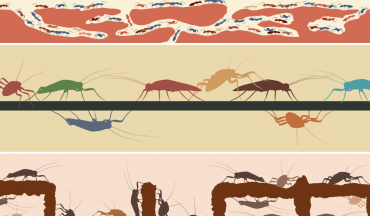
Bees are turned off by the electrical changes created by pesticides. A study offers a new perspective on how human-made chemicals disturb the natural environment.
Pollinators are less likely to land on flowers sprayed with fertilisers or pesticides as they can detect electric field changes around the flower, researchers have recently discovered. While science has proven that pesticides are toxic, they know little about how they affect the immediate interaction between plants and pollinators. A new study sheds light on how chemicals immediately alter feeding action of pollinators.
A study, published in PNAS Nexus, shows that chemical sprays alter the electric field around flowers for up to 25 minutes after exposure. This impact lasts substantially longer than natural fluctuations, such as those caused by wind, and causes a reduction in bee feeding effort in nature. That means, this is a sound argument for the immediate and direct effects of pesticides on pollinators.
Ellard Hunting at the University of Bristol and his team noted that fertilisers did not affect the vision and smell of the bees, and set out to mimic the electrical changes caused by fertilisers and pesticides in the field by electrically manipulating flowers. This showed that bumblebees were able to detect and discriminate against the small and dynamic electric field alterations that are caused by the chemicals.
Hunting said: “We know that chemicals are toxic, but we know little about how they affect the immediate interaction between plants and pollinators. Flowers have a range of cues that attract bees to promote feeding and pollination. For instance, bees use cues like flower odour and colour, but they also use electric fields to identify plants.
“A big issue is thus – agrochemical application can distort floral cues and modify behaviour in pollinators like bees.”
Other airborne materials that affect bees and other pollinators
Various other airborne particles such as nanoparticles, car and factory exhaust, nano-plastics, and viral particles may have similar impacts, affecting a wide array of organisms that use the electric fields that are virtually everywhere in the environment.
Co-author, Bristol’s Sam England, explained: “What makes this study important is that it’s the first known example of anthropogenic ‘noise’ interfering with a terrestrial animal’s electrical sense.
”It’s much like motorboat noise that hinders the ability of fish to detect their predators, or artificial light at night that confuses moths; the fertilisers are a source of noise to bees trying to detect floral electrical cues.
“This widens our understanding of the multifaceted ways in which human activity is negatively impacting the natural world, which can seem quite depressing, but it will hopefully allow is to introduce or invent solutions to prevent the adverse effects that these chemicals may be having on bees.”
Want to do more for the bees and other pollinators? A home garden can help the bees. Read here.





